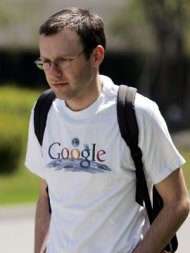• The customer base for Google+ is overwhelmingly male
The service's following so far is heavily male--88 percent, compared to 10 percent women, and 2 percent who did not supply gender information--according to SocialStatistics.com, which is surveying users of the new service and ranking the top 100 according to number of followers.
When The Cutline talked to Boris Veldhuijzen van Zanten, who previously founded Twitter Counter and TheNextWeb, he said users of the service seem principally focused on finding people to follow, rather than amassing circles of their own friends. "As in the early days of Twitter everybody is looking for people to follow," van Zanten said. "So it makes sense to start with a few famous people to get a feel for what they are doing." As of this morning, SocialStatistics was indexing more than 9,000 users and adding one account every two seconds.
And who is the top followed user? As Alexia Tsotisis of Tech Crunch notes, it's none other than Facebook founder Mark Zuckerberg, who gained over 21,000 followers on the 4th of July alone.
• Google is capitalizing on being the nice guy
Over at The Atlantic, James Fallows says the potential success of Google+ is linked to Google's corporate reputation. "Google errs and oversteps and can seem threateningly large, but in the end it acts as if it has a conscience," writes Fallows. He points to an essay by Michael Luna, where Luna argues that Google's political stands have smoothed his own transition from other social-networking sites into the search behemoth:
Google is currently in a power war with China.... It took a stand, and now it's fighting the Chinese government more strongly on issues of freedom of information and security than any major company I'm aware of.
Another user benefit that early adopters report favorably on is the ability to immediately pick not just your friends, but which "circle of sharing" they will inhabit on the service. Such positive early reviews could mean that the service's largest rival, Facebook, is starting to look anxiously over its shoulder. The tech site Mashable reported yesterday that the company was blocking a browser extension that would allow users to extract Facebook contacts for use in other services.
• Google+ is driving traffic
For journalism, the big promise of social media has always been the (relatively) free distribution of content. Joshua Benton argued convincingly back in April that to understand how well a publication was doing it was helpful to look at the number of stories being shared. (In his example, Benton logged how often stories from Rupert Murdoch's iPad-only publication The Daily appeared on Twitter)
Tech Crunch reported yesterday that Google+ had already become one of the top 10 sites referring users back to the popular technology news site, only one week into its launch. "The amount of inbound traffic we're seeing from Google+ is pretty crazy considering that we're not even officially using it to share links yet," writes MG Siegler. "On both Facebook and Twitter we send out links to our followers and this leads to most of the click-backs (either directly or by re-sharing). On Google+, we're not doing anything yet, it's all happening from others sharing our links organically."
However, site developers may not see the full effect of Google+ on brand building until the launch of Google+ pages for businesses which is expected "in the near future," according to Google VP Jeff Huber.
• Group video is the killer app
Over at the Times, Jenna Wortham evangelizes for Google+'s "Hangout" feature, which streams multiple video feeds into a single space: "it was a fun, synchronous hangout time on the Internet not quite like anything I've ever experienced online." She stayed online in the chat until 3 a.m. sharing gifs and indulging in an impromptu videostreamed karaoke performance.
D.C. pundit Julian Sanchez echoed this positive appraisal of group videos in his review of the service, speculating that the informality of the chat rooms would allow for more spontaneous, casual conversations that might feel forced in a one-on-one service such as Skype, Apple's FaceTime, or Google Video Chat. "Everyone's more comfortable opening the channel and leaving it active because it's not making the same kind of demands as a phone call," Sanchez writes.
So what next for Google+? The service's real test will be how widely it's adopted beyond this early, discerning circle of tech ethusiasts. "So far google+ friending seems to be more about a shared present/future than a shared past" tweeted out Tomorrow Museum's Joanne McNeil (attributing the quote to Farrah Bostic). Building out yet another social network identity is going to be a hard sell for folks who don't already spend their days glued to a laptop. But with goodwill and snazzy tech, maybe the Google + evangelists can convince even the curmudgeons among us to join up.

No comments:
Post a Comment